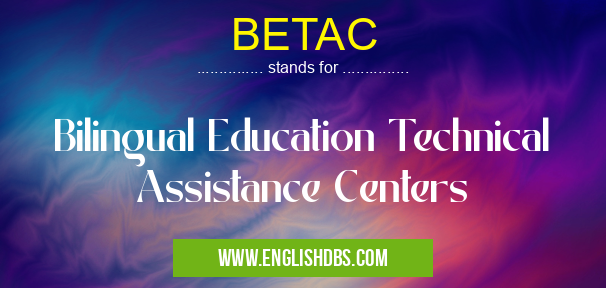What does BETAC mean in EDUCATIONAL
BETAC (Bilingual Education Technical Assistance Centers) are federally funded organizations that provide support and resources to school districts and other educational entities implementing bilingual education programs. The primary goal of BETACs is to enhance the quality of bilingual education services for students from linguistically diverse backgrounds.

BETAC meaning in Educational in Community
BETAC mostly used in an acronym Educational in Category Community that means Bilingual Education Technical Assistance Centers
Shorthand: BETAC,
Full Form: Bilingual Education Technical Assistance Centers
For more information of "Bilingual Education Technical Assistance Centers", see the section below.
» Community » Educational
Meaning in Education
BETACs play a significant role in supporting the implementation of effective bilingual education programs by:
- Providing technical assistance to educators, administrators, and parents on best practices in bilingual education
- Developing and disseminating research-based resources on bilingual education
- Offering professional development opportunities for educators working with English language learners
Key Functions of BETACs
BETACs typically perform the following functions:
- Needs assessment: Identifying the needs of school districts and educational entities in implementing bilingual education programs.
- Training and technical assistance: Providing training and support to educators, administrators, and parents on effective bilingual education practices.
- Resource development: Developing and disseminating resources, such as curriculum materials and professional learning modules, to support bilingual education.
- Evaluation and research: Conducting evaluations and research to assess the effectiveness of bilingual education programs and inform best practices.
- Collaboration and partnerships: Collaborating with other organizations, such as universities and community groups, to provide comprehensive support for bilingual education.
Essential Questions and Answers on Bilingual Education Technical Assistance Centers in "COMMUNITY»EDUCATIONAL"
What are Bilingual Education Technical Assistance Centers (BETACs)?
BETACs are federally funded centers that provide technical assistance to K-12 educational agencies, schools, and other organizations implementing bilingual education programs. They offer a range of services, including professional development, curriculum and instructional materials development, and program evaluation.
What types of services do BETACs provide?
BETACs offer a wide range of services to support bilingual education programs. These services include:
- Professional development for teachers and administrators
- Development of curriculum and instructional materials
- Program evaluation and assessment
- Research and dissemination of best practices
- Technical assistance on specific issues related to bilingual education
Who is eligible to receive services from a BETAC?
BETACs provide services to K-12 educational agencies, schools, and other organizations implementing bilingual education programs. This includes public and private schools, charter schools, and non-profit organizations.
How do I contact a BETAC?
You can contact a BETAC by visiting their website or calling their toll-free number. The contact information for each BETAC is available on the U.S. Department of Education's website.
What are the benefits of working with a BETAC?
There are many benefits to working with a BETAC. BETACs can provide:
- Access to expertise in bilingual education
- Support for implementing and improving bilingual education programs
- Professional development opportunities for teachers and administrators
- Resources and materials to support bilingual education
Final Words: BETACs are essential partners in the field of bilingual education, providing invaluable resources and support to educators and educational entities seeking to improve the quality of educational services for linguistically diverse students. Their expertise and dedication to promoting equity and access in education make them a cornerstone of successful bilingual education programs.
